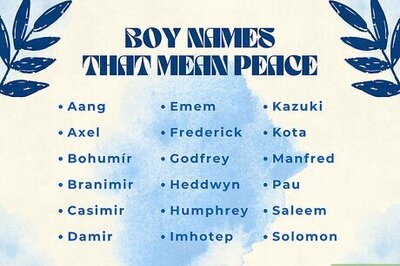
views
Amendments to the Indian Penal Code, bringing in new provisions, and dropping or changing names of sections have attracted debates on various legal and political grounds.
However, the proposed Bharatiya Nyaya Sanhita (BNS) is also a way of bringing back the ‘Bharatiya’ language supremacy. The word and expressions ‘related to crown’ have been dropped from the penal code and more such changes in ‘administration’ are needed, said a senior RSS functionary.
Shrugging off the British way of calling the criminal codes, Union Home Minister Amit Shah replaced Indian Penal Code, Code of Criminal Procedure (CrPC) and Indian Evidence Act with Bharatiya Nyaya Sanhita (BNS), Bharatiya Nagrik Suraksha Sanhita (BNSS) and Bharatiya Sakshya (BS) Bill respectively. To RSS, it is a step forward to the ‘decolonisation’ process of India, said experts.
“Rajdroha Ko Hum completely repeal kar rahe hain… yeh Loktantra hai,” Shah said while presenting the Bill. Technicalities apart, the idea behind dropping the word sedition was its primary association with monarchy. Lauding the government’s efforts to overhaul the criminal justice system, the RSS functionary said, “Sedition has always been associated with the crown. The dictionary meaning also says so. Apart from sedition, there are more such words which should not be used in democracy. They are related to a system of monarchy. Over the years, there were reforms, governments amended or tweaked certain rules and regulations. But after 76 years of Independence, we now need Bharatiyata or Indian-ness.”
The functionary added: “We still use the word collector for district magistrates. Now, both collector and magistrate are very colonial words. Collector means an official who collects taxes. However, this is a service for the people, and the tax people deposit with government exchequers is used in service and development. So those nomenclature should now be refined to suit Indian culture. Beyond reforms, we also need systematic changes, which are now taking place.”
They also said not including penal sections or even mentioning the controversial term ‘marital rape’ is another way of retaining the idea of marriage as an institution, which is a Bharatiya concept. In the past years, the idea of “marital rape” has been debated enough and has also emerged as contentious issue. Petitions were filed before courts regarding this too.
System reboot
The process began through the education system, bringing in changes in the syllabus and doing away with names connected to India’s colonial past. The process progressed further by building a new set of books reflecting ‘nationalism’ and Right-wing ideology, making Indian cinema ‘pro-Bharat’. Now, this is the time to bring changes in the administration and legal system, not only by amending certain rules or regulations but bringing a change in its cultural space through language.
The process of moving away from English titles of laws or systems, technical, legal or administrative words, promoting official documents in Hindi or in regional languages in case of states started a few years back.
For instance, the investigations by the Central Bureau of Investigation (CBI) were named Operation ‘Garuda’ for dismantling the drug network, Operation ‘Chakra’ to crack down on cybercrime, and Operation ‘Trishul’ to net the fugitives over the past five years. Earlier, the big cases were used to be called scandals such as Bofors, Satyam or as scams like the fodder scam and so on. The new way of naming certain investigations is reflective of Indian culture, said a senior officer of CBI.
“Calling a case like an X scam or Y Scandal is a British way of identifying it. We tried to modify that. Garuda is the divine sun bird which is associated with Indian scriptures. Chakra and Trishul are the divine weapons of our Gods. Not only in the CBI, but the change has been happening across ministries, departments and government organisations. We are slowly getting rid of colonial practices and dictions,” said a senior IPS officer serving in the CBI.
Talking to News18, Justice L Narasimha Reddy, former chairman of the Central Administrative Tribunal (CAT) and former CJ of Patna High Court said, “Apart from the necessary amendments, bringing in Bharatiyata in Indian jurisprudence was necessary. It was long pending. It will enhance our confidence. Why should we still use the westernised administrative and legal framework?” he asked.
Hindi supremacy?
Even though the Narendra Modi government and RSS both claim to make the legal and administrative system Bharatiya by dropping all ‘colonial’ words and expressions, there are some reservations too in the bureaucratic circle.
“For the past few years, we have noticed and experienced this change. It is Hindi supremacy too. In the past couple of years, the officers need to deliver their presentations in Hindi during the national conferences which have PM Modi or Amit Shah in attendance. We are asked to work on our Hindi speaking skills. The PPTs, even prepared in English, get translated in Hindi. The officer who is well conversant in Hindi presents it during such conferences while the officer who actually prepared it cannot do so if he is not a confident Hindi-speaking person,” said a senior IPS officer, who does not want to be quoted.
However, Justice Reddy said: “I understand that the change, especially the language change, will not be easy but it should be accepted by all well-meaning Indians. It will take time in assimilation, but we should reboot the system at some point. Barring a few exceptions, the proposed BNS has been accepted by the legal and administrative fraternity. I understand the issue but most of the regional languages of India come from Sanskrit.”
He added: “Languages like Malayalam or Bengali are rich in Sanskrit words. I also wish that the government allows liberty to the states to translate the ‘Sanhita’ in their own languages. In countries like China, Japan and even the western one likes France, Germany and others, every official document is written in their own language. We have seen how airports have successfully used local languages. I am sure that the officers will also be trained for such a systematic change.”
















Comments
0 comment